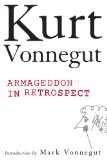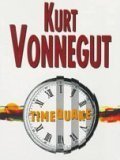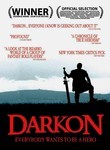 (Feel free to skip this review, if you like, and jump straight to the book. The title of this post refers to the latter; this once, I won’t be hurt.)
(Feel free to skip this review, if you like, and jump straight to the book. The title of this post refers to the latter; this once, I won’t be hurt.)
There’s a magic in Vonnegut’s writing that I’ve never found in any other. I’ve found many an author that can take me in, that can transport me and move me, but no other can touch my (cliche? why not?) soul like the late KVJ. Walking away from a reading of some of his books leaves that same ethereal, other-worldly, drugged feeling that I go coming out of my first theatrical viewings of The Matrix and Memento. Sure, I’ve got plenty of movies that I’ve loved in my life, but so very few that profoundly affected me on a core for which I have no words.
There were a few of his books — like Cat’s Cradle, maybe, or a few of the shorts in Welcome to the Monkey House — that, as wonderful as they were, didn’t hit me any harder than my other favorites (Palahniuk, McCammon, King), but at the top of his game, Vonnegut is king, and the posthumous Armageddon in Retrospect is a fitting memorial landmark for his kingdom.
Before reading the short fiction and essays collected in Armageddon, it’s best to have read Slaughterhouse Five, his absurdist novel memoir of his experience as a POW who survived the Allied firebombing of Dresden, Germany in 1945. The two work wonderfully together to show, both through the words and the tone, the effects and the horror of war. None of this comes across as preachy, though it definitely has a distinct point of view.
After reading Armageddon, it seems a lot clearer to me why so many politicians who have never seen combat (or served in anything more dangerous than a Guard reserve unit) have no reservations about sending people into war for any reason other than absolute necessity. I think that if more people in positions of power had seen and experienced anything even remotely close to what obviously shaped so much of Vonnegut’s life, then a number of conflicts (such as we are currently engaged in in Iraq, for instance) would never have happened, and uncountable decisions in the course of wars might be a little better considered.
 Perhaps those sitting in higher places should be forced to read and memorize both Armageddon in Retrospect and Slaughterhouse Five, as well as the tragically overlooked and underrated Timequake (in which the entire world is forced to relive ten years in realtime, both successes and tragedies). Maybe then they’d be more careful (and not to imply that all wars are based on cavalier decisions, though I’m certain that there are a few of those) about considering the costs of their goals, and whether the two balance in the end.
Perhaps those sitting in higher places should be forced to read and memorize both Armageddon in Retrospect and Slaughterhouse Five, as well as the tragically overlooked and underrated Timequake (in which the entire world is forced to relive ten years in realtime, both successes and tragedies). Maybe then they’d be more careful (and not to imply that all wars are based on cavalier decisions, though I’m certain that there are a few of those) about considering the costs of their goals, and whether the two balance in the end.
But probably not, because there are other things at stake besides regret and understanding atrocity, like oil rights and the wants of their cronies.
So it goes.
Rest well, Kurt, and know that you made a mark on at least one of us.
Shut up and think of something more important to say…






